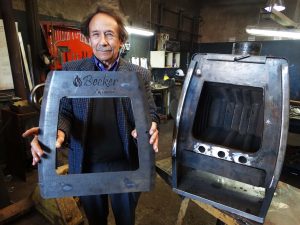Santiago, Sep 22 (EFE).- A Chilean researcher has invented an ecoefficient heater that burns wood but promises to save up to 75 percent of fuel and provide more than 90 percent of heating efficiency, while making sure that the energy of firewood is transferred to people’s homes and not to their lungs.”
The inventor Hector Becker is a thermodynamics expert at the Wood Engineering Department at the University of Bio Bio (UBB), who, according to a report seen by EFE, is excited about the first results of his factory-made system.
The results recorded in the report show more than 90 percent caloric efficiency and a reduction of up to 75 percent of toxic emissions.

Educated at the Free University of Brussels and a student of 1972 Nobel prizewinner Ilya Prigogine, Becker considers it perfectly possible to substantially improve the energy efficiency and performance of existing wood-fired heating systems.
The efficiency of the heater will soon be tested by the Wood Engineering Department at UBB in order to ratify the results of the first evaluations.
In this new technology, unlike those using heat-resistant materials, the combustion chamber is made up of a system of tubes whose arrangement makes it able to recover the radiation from the burning firewood.
This is a concept originally developed in Germany to raise the efficiency of its biomass cauldrons,and perfected by Becker in a series of industrial projects in Central America, where he was based.
The system also manages to burn gases like the alkane series, creosote and pyroligneous acid, present in chimneys and in the air of cities in southern Chile.
Becker also incorporated a catalytic combustion chamber that burns efficiently and heats the home at the rate of “one wood chip per hour,” according to the researcher.
“The first time I lit the prototype, in just a few minutes the gases emitted became translucent,” his report said.
That was because the system mixes the gases “with the secondary air and the flames, so that most are burned away,” he said.
“Our system is able to burn three or four times less firewood to heat a home, while offering important advantages for the user, the environment and forest reserves,” he said.
For Becker, the project does away with the mistaken belief about the polluting effects of firewood as a means of heating the home.
